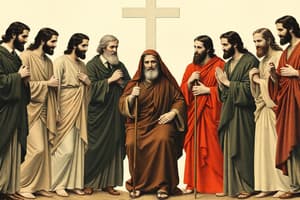Podcast
Questions and Answers
What was the significance of the number of apostles Jesus chose?
What was the significance of the number of apostles Jesus chose?
- It reflected the number of regions in Galilee.
- It corresponded to the number of years he preached.
- It symbolized the twelve tribes of Israel. (correct)
- It represented the number of disciples who initially followed him.
Which of the following activities did Jesus not engage in during his public ministry?
Which of the following activities did Jesus not engage in during his public ministry?
- Casting out demons
- Preaching in synagogues
- Establishing a political party (correct)
- Healing the sick
Beyond proclaiming God's kingdom, what other key purpose drove Jesus' public ministry?
Beyond proclaiming God's kingdom, what other key purpose drove Jesus' public ministry?
- Overthrowing Roman rule
- Forming a group of disciples to continue his work (correct)
- Performing miracles to gain followers
- Establishing a new religious code
Which of the following best describes the nature of Jesus' public ministry?
Which of the following best describes the nature of Jesus' public ministry?
Who among the following was not one of Jesus' twelve apostles?
Who among the following was not one of Jesus' twelve apostles?
Flashcards
Jesus' purposes
Jesus' purposes
Proclaim God's kingdom and form his disciples.
The Twelve Apostles
The Twelve Apostles
The twelve men chosen by Jesus to spread his teachings.
Compassionate actions
Compassionate actions
Jesus showed kindness by healing and helping people.
Harvest is plentiful
Harvest is plentiful
Signup and view all the flashcards
Night of prayer
Night of prayer
Signup and view all the flashcards
Study Notes
Jesus's Ministry
- Jesus had two main goals during his ministry:
- Proclaiming the coming of God's kingdom
- Forming a group of disciples to continue his work after his death
Disciples and Apostles
- Jesus traveled around Galilee, preaching, healing the sick, and expelling demons
- Showing compassion for the people
- Recognizing the need for more laborers to spread his message
- Jesus chose twelve apostles (messengers) to help spread the word
- The twelve apostles were chosen to lead the faith community
- The number twelve is symbolic of the twelve tribes of Israel
Names of the Apostles
- Simon (Peter) and Andrew
- James and John
- Philip and Bartholomew
- Thomas
- Matthew
- Thaddaeus
- James, son of Alphaeus
- Simon the Zealot
- Judas Iscariot
Studying That Suits You
Use AI to generate personalized quizzes and flashcards to suit your learning preferences.





